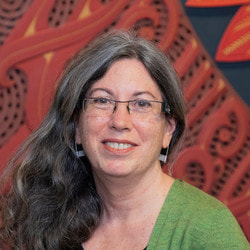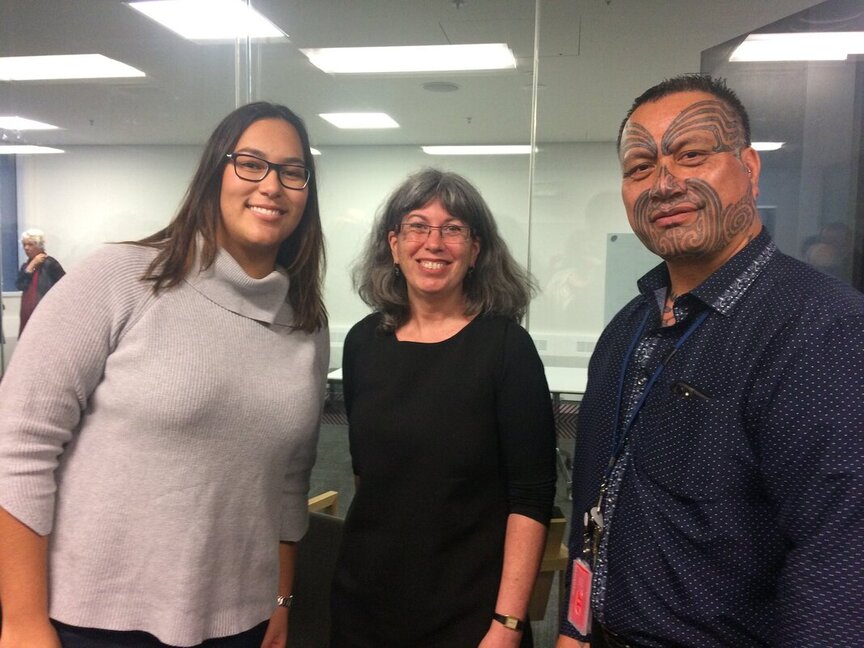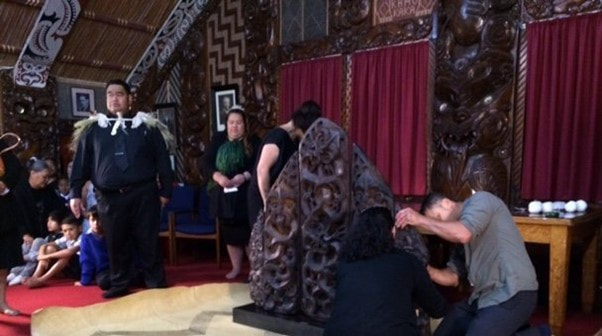DALE COUSENS (NGĀ RUAHINE)

I te taha o tōku Pāpā
Ko Aotea te waka
Ko Taranaki te mounga
Ko Waingongoro te awa
Ko Kanihi/Umutahi me etahi atu te hapū
Ko Ngā Ruahine te iwi
I te taha o tōku Māmā ko Ngāti Pākehā ahau nō Ōtākau mātou
A JOURNEY FROM AOTEAROA TO AUSTRALIA AND BACK
Dale was born in Lower Hutt and grew up in Australia where she trained in library studies and worked in public libraries before returning to Aotearoa in 2008. She has whakapapa to Ngā Ruahine in South Taranaki through her father and her mother’s whānau comes from Southland.
“I’ve always been a librarian. I ran a library in the basement of my grandparent’s house when I was in primary school in the holidays when I visited. I applied to attend university and put down three library courses and teaching in case I didn’t get into library studies.
“It was interesting training at that time in New South Wales. There was a middle strand of tertiary training that offered degrees in practical studies and library studies was one of them. Each semester there was a placement in libraries which meant I was exposed to all types of libraries: health libraries, special libraries, public libraries, school libraries, in all areas of work. It confirmed for me that I was doing the right thing and exposed me to the huge variety and scope that libraries have. And that libraries will take you places.”
Ko Aotea te waka
Ko Taranaki te mounga
Ko Waingongoro te awa
Ko Kanihi/Umutahi me etahi atu te hapū
Ko Ngā Ruahine te iwi
I te taha o tōku Māmā ko Ngāti Pākehā ahau nō Ōtākau mātou
A JOURNEY FROM AOTEAROA TO AUSTRALIA AND BACK
Dale was born in Lower Hutt and grew up in Australia where she trained in library studies and worked in public libraries before returning to Aotearoa in 2008. She has whakapapa to Ngā Ruahine in South Taranaki through her father and her mother’s whānau comes from Southland.
“I’ve always been a librarian. I ran a library in the basement of my grandparent’s house when I was in primary school in the holidays when I visited. I applied to attend university and put down three library courses and teaching in case I didn’t get into library studies.
“It was interesting training at that time in New South Wales. There was a middle strand of tertiary training that offered degrees in practical studies and library studies was one of them. Each semester there was a placement in libraries which meant I was exposed to all types of libraries: health libraries, special libraries, public libraries, school libraries, in all areas of work. It confirmed for me that I was doing the right thing and exposed me to the huge variety and scope that libraries have. And that libraries will take you places.”
 Ella Diamond, Dale Cousens and Les Hoerara at National Library of New Zealand. Image credit National Library
Ella Diamond, Dale Cousens and Les Hoerara at National Library of New Zealand. Image credit National Library
CURRENT ROLE AT TE PUNA MATAURANGA NATIONAL LIBRARY
In her current role, she is co-leader of a team that is partnered with legal deposit. The co-joined team is responsible for bringing published works into the library. “Through Legal Deposit that’s everything published in New Zealand and through Acquisitions we purchase resources for the Services to School’s collection, the music hire collection, the print disability collection, and materials about New Zealand and by New Zealanders but published overseas.”
“Part of my job is people management, which has been interesting during COVID and protests. Another large part is to work with the team to make sure our acquisitions processes are efficient and to monitor our collections budget. We’re guided in what we buy by our collecting policy and plans as well as by curators and specialist research staff, purchasing a massive variety of materials: audiobooks, scores, and music recordings as well as books.”
She also works as one of the admins for the Librarian Management System as she has a background in this. More recently Dale has provided Tikanga support, an area she is excited and slightly nervous about moving into.
“I have opportunities to attend wānanga and I jump at these. I am still new in my journey – I have been actively a librarian for longer than I have been actively Māori as my personal journey started when I came back to Aotearoa to work at Puke Ariki. This is when I started to explore my whakapapa, my journey in Karanga, weaving, Tikanga in a corporate space, and my journey in Te Reo Māori. I’m taking one step at a time as my experience is very very different from someone who was bought up in Aotearoa, in their hapu and iwi and in Te Reo. I make the most of my opportunities.”
CAREER HIGHLIGHTS
“I’ve had amazing opportunities because of where I worked. One was the return of the Motunui pātaka panels to New Plymouth which had turned up in a private collection. I was working at Puke Ariki when they came home. If anyone doubts the power of those taonga and the stories that they carry – it’s huge. To be involved in such a big tikanga event like that was phenomenal.
Another significant event I was involved with was the moving of the documents for He Tohu from Archives to the National Library. Again, the power of those taonga, everyone they represent, and the tikanga of the event were amazing. These are opportunities I would never have had if I hadn’t been a librarian.”
“I’ve had amazing opportunities because of where I worked. One was the return of the Motunui pātaka panels to New Plymouth which had turned up in a private collection. I was working at Puke Ariki when they came home. If anyone doubts the power of those taonga and the stories that they carry – it’s huge. To be involved in such a big tikanga event like that was phenomenal.
Another significant event I was involved with was the moving of the documents for He Tohu from Archives to the National Library. Again, the power of those taonga, everyone they represent, and the tikanga of the event were amazing. These are opportunities I would never have had if I hadn’t been a librarian.”
 The dawn ceremony for the return of the famed Motunui Panels to Ōwae Marae.Image credit: Te Ao Māori News Maiki Sherman
The dawn ceremony for the return of the famed Motunui Panels to Ōwae Marae.Image credit: Te Ao Māori News Maiki Sherman
ADVICE TO THOSE STARTING THEIR LIBRARY CAREER
“These were the things I wish someone had told me when I first started. First one is ‘Do all the jobs’ and by that, I mean to take every opportunity to learn a new skill or task and be willing to use those skills at any time. I love returning to my ‘library roots’ and helping with receiving material into our LMS, sorting mail etc, even if it’s only very occasionally as an emergency backup.
And question yourself: How far are you prepared to go? I’ve had a couple of discussions with people who are early career and told me they can’t get a job. I’ve said that I’ve seen jobs advertised all over the country that they would be perfect for – but they might be in a smaller rural area. Small libraries give you an amazing experience as you get to do all the jobs! Even if it’s not physically relocating (which is not an option for most people for very good reasons). How far out of your comfort zone are you prepared to go? Would you apply for a job in a different sector or would allow you to build skills you don’t currently have?
You don’t necessarily need a career plan – my career plan has always been to consider every opportunity that crosses my path and think about how far I’m prepared to go. I’ve packed my life up and moved a few times – but that’s me and it’s been worth it.”
TOP BOOK, EVENT OR RESOURCE RECOMMENDATION
“I would tell people to go to a big conference like LIANZA or VALA. Treat it as a mind-expanding experience and don’t only go to papers that reflect your current job.
I have a distinct memory of sitting at a VALA conference in Melbourne in the 1990s listening to a Scandinavian librarian talking about archiving the internet! Wow - the internet was in its baby stages at the time– but now we’re all thinking about doing this.”
WHAT LIBRARIES AND THE SECTOR LOOK LIKE IN THE FUTURE
I’d really like to see libraries recognised for everything they provide – it’s not all on the internet! Libraries are critical infrastructure for business, academic settings, and the community. They are important keepers and sharers of stories, information, and knowledge.
Some of the things libraries contributed during COVID was their importance as community connectors, regardless of the sector they are in. And a whole new group has realised they can sign up at their local library and get e-books and resources now.
Public libraries are one place that many people leave their homes to visit. They are one of the last free indoor spaces where you can come and connect with others, check your emails, read a book or the newspaper, and one of the few spaces where people can learn social literacy. People get to mix with people that aren’t like them, in a safe and supportive environment. This needs to be valued in a way that it often isn’t.
June 2022
“These were the things I wish someone had told me when I first started. First one is ‘Do all the jobs’ and by that, I mean to take every opportunity to learn a new skill or task and be willing to use those skills at any time. I love returning to my ‘library roots’ and helping with receiving material into our LMS, sorting mail etc, even if it’s only very occasionally as an emergency backup.
And question yourself: How far are you prepared to go? I’ve had a couple of discussions with people who are early career and told me they can’t get a job. I’ve said that I’ve seen jobs advertised all over the country that they would be perfect for – but they might be in a smaller rural area. Small libraries give you an amazing experience as you get to do all the jobs! Even if it’s not physically relocating (which is not an option for most people for very good reasons). How far out of your comfort zone are you prepared to go? Would you apply for a job in a different sector or would allow you to build skills you don’t currently have?
You don’t necessarily need a career plan – my career plan has always been to consider every opportunity that crosses my path and think about how far I’m prepared to go. I’ve packed my life up and moved a few times – but that’s me and it’s been worth it.”
TOP BOOK, EVENT OR RESOURCE RECOMMENDATION
“I would tell people to go to a big conference like LIANZA or VALA. Treat it as a mind-expanding experience and don’t only go to papers that reflect your current job.
I have a distinct memory of sitting at a VALA conference in Melbourne in the 1990s listening to a Scandinavian librarian talking about archiving the internet! Wow - the internet was in its baby stages at the time– but now we’re all thinking about doing this.”
WHAT LIBRARIES AND THE SECTOR LOOK LIKE IN THE FUTURE
I’d really like to see libraries recognised for everything they provide – it’s not all on the internet! Libraries are critical infrastructure for business, academic settings, and the community. They are important keepers and sharers of stories, information, and knowledge.
Some of the things libraries contributed during COVID was their importance as community connectors, regardless of the sector they are in. And a whole new group has realised they can sign up at their local library and get e-books and resources now.
Public libraries are one place that many people leave their homes to visit. They are one of the last free indoor spaces where you can come and connect with others, check your emails, read a book or the newspaper, and one of the few spaces where people can learn social literacy. People get to mix with people that aren’t like them, in a safe and supportive environment. This needs to be valued in a way that it often isn’t.
June 2022
